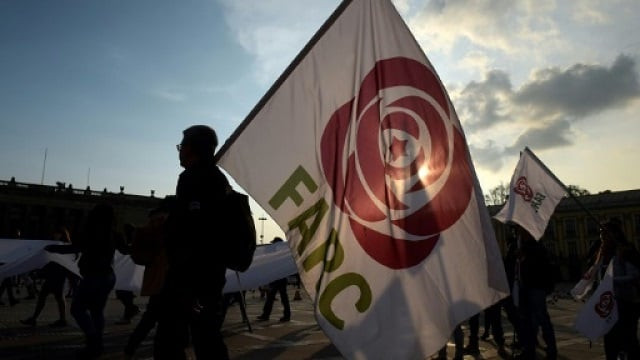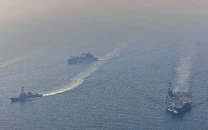UN envoy warns against reopening Colombia peace deal
Carlos Ruiz Massieu says such a move will bring 'greatest uncertainty' to peace accord

People hold flags of the Common Alternative Revolutionary Force (FARC) party during a protest against a reform proposed by the government for the Special Jurisdiction for Peace (JEP) in Bogota, on March 13, 2019. People hold flags of the Common Alternative Revolutionary Force (FARC) party during a protest against a reform proposed by the government for the Special Jurisdiction for Peace (JEP) in Bogota. PHOTO: AFP/FILE
Carlos Ruiz Massieu told the Security Council that such a move would bring "the greatest uncertainty" to the peace accord that ended five decades of conflict in the South American country.
Colombian President Ivan Duque was elected last year on a pledge to roll back some aspects of the peace deal including the Special Jurisdiction for Peace (JEP) set up to try former combatants accused of atrocities.
Ten killed in Colombia clash with FARC splinter group
"In a climate of uncertainty - for victims, for those subject to the Special Jurisdiction for Peace, for FARC members awaiting funding for social and economic reintegration and for communities who have suffered from the conflict- the greatest uncertainty would be to reopen core elements of the underlying peace agreement itself," said Ruiz Massieu.
Under the JEP, ex-rebels or soldiers would receive alternative sentences to prison time if they confess their crimes, compensate victims and pledge never to resort to violence again.
New Colombia government to review decision to recognize Palestine
Transformed into a political party since the peace deal, FARC has hit out repeatedly at the lack of security guarantees for its members.
While some 7,000 ex-fighters laid down their weapons, Colombia's peace and reconciliation commission estimates 1,600 dissident rebels remain active.
Colombian Foreign Minister Carlos Holmes Trujillo told the council that his government will respect the decision taken by lawmakers on the JEP.
The Colombian lower house of congress this week rejected proposed changes to the JEP and the Senate is now expected to take a position.



















COMMENTS
Comments are moderated and generally will be posted if they are on-topic and not abusive.
For more information, please see our Comments FAQ